Nbme 11 answers step 2 – Embark on a journey to conquer NBME 11 Step 2 with this comprehensive guide. Unravel the secrets of the exam, delve into the content, and discover time-tested strategies to maximize your performance. Let’s demystify NBME 11 and pave the path to success.
Prepare yourself for an in-depth exploration of the NBME 11 exam, its structure, content, and scoring system. We’ll provide expert insights, effective study techniques, and invaluable test-taking tips to help you excel.
Overview of NBME 11
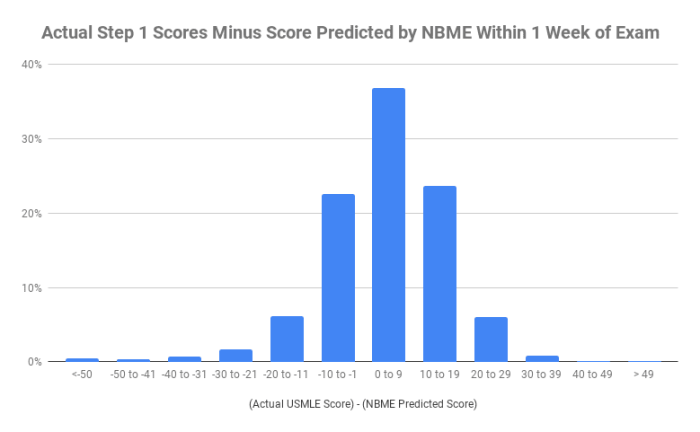
NBME 11 is a comprehensive medical licensing examination designed to assess the knowledge and skills of medical students and physicians preparing for the United States Medical Licensing Examination (USMLE) Step 2 Clinical Knowledge (CK) exam. It is a computer-based test that covers a wide range of medical topics, including internal medicine, surgery, pediatrics, obstetrics and gynecology, psychiatry, and family medicine.The
NBME 11 exam consists of 200 multiple-choice questions that are divided into eight blocks of 25 questions each. Each block covers a different medical topic, and the questions are designed to test the candidate’s understanding of the basic sciences, clinical medicine, and patient management.
The exam is timed, and candidates have 4 hours and 15 minutes to complete all 200 questions.
Study Materials and Preparation
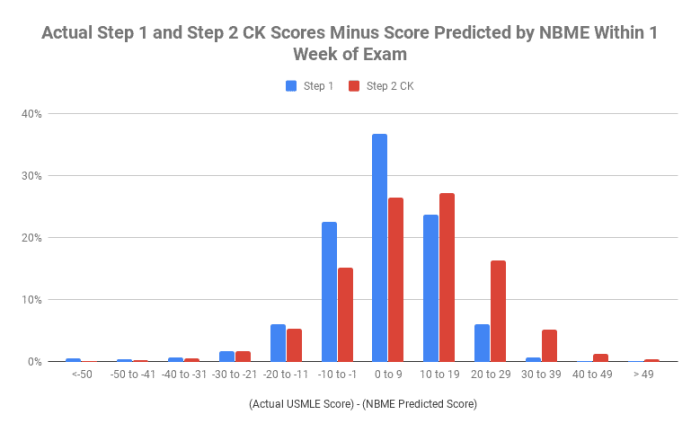
Preparing for NBME 11 requires a comprehensive approach. By utilizing a range of study materials and adopting effective techniques, you can maximize your chances of success.
Recommended study materials include UWorld, Amboss, First Aid for the USMLE Step 2 CK, Kaplan Qbank, and NBMEs. These resources provide a solid foundation of knowledge and practice questions.
Effective Study Strategies
To enhance your preparation, consider implementing the following strategies:
- Create a structured study plan:Allocate specific time slots for studying and stick to them.
- Active recall:Regularly test your understanding by recalling information from memory without looking at your notes.
- Spaced repetition:Review material at increasing intervals to improve retention.
- Practice questions:Solve numerous practice questions to familiarize yourself with exam formats and identify areas for improvement.
- Focus on high-yield topics:Prioritize studying concepts commonly tested on the exam.
Content Breakdown
NBME 11 covers a wide range of medical topics, with a focus on high-yield concepts that are frequently tested on the Step 2 CK exam.
The content is organized into the following major categories:
Internal Medicine
- Cardiovascular
- Endocrine
- Gastrointestinal
- Hematology/Oncology
- Infectious Disease
- Pulmonary
- Renal
Surgery
- General Surgery
- Orthopedic Surgery
- Urology
Obstetrics and Gynecology
- Obstetrics
- Gynecology
Pediatrics
- General Pediatrics
- Neonatology
Psychiatry
- Adult Psychiatry
- Child and Adolescent Psychiatry
Neurology
- Neurology
- Neurosurgery
Dermatology
- Dermatology
Emergency Medicine
- Emergency Medicine
Ethics
- Ethics
Question Types and Formats
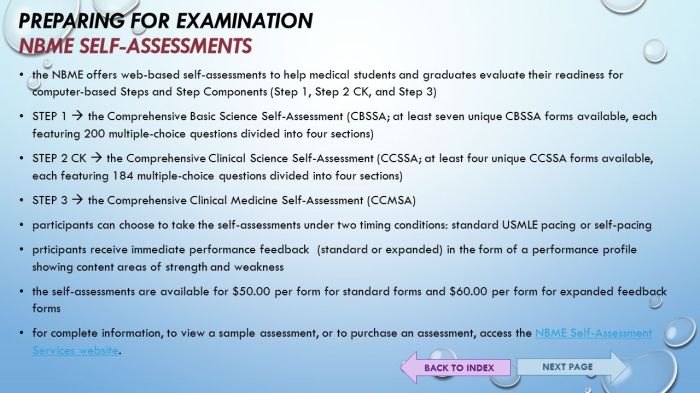
NBME 11 employs various question formats to assess your medical knowledge and clinical reasoning skills. Understanding these formats will help you approach the exam confidently and effectively.
The following question types are commonly encountered in NBME 11:
Single Best Answer (SBA)
These questions present you with a clinical scenario and several answer options. Your task is to select the single best answer that most accurately addresses the question or solves the problem.
Multiple Choice Questions (MCQs), Nbme 11 answers step 2
MCQs provide you with a question or statement followed by multiple answer choices. You need to select all the correct answers that apply to the question.
Extended Matching Items (EMIs)
EMIs present you with a list of clinical scenarios or questions and a separate list of answer options. You must match each scenario or question to the most appropriate answer option.
True/False Questions
These questions require you to determine whether a given statement is true or false. Carefully consider the statement and identify any potential ambiguities or exceptions.
Short Answer Questions (SAQs)
SAQs assess your ability to provide concise written responses to clinical questions. Your answers should be specific, accurate, and demonstrate your understanding of the concepts being tested.
Time Management Strategies
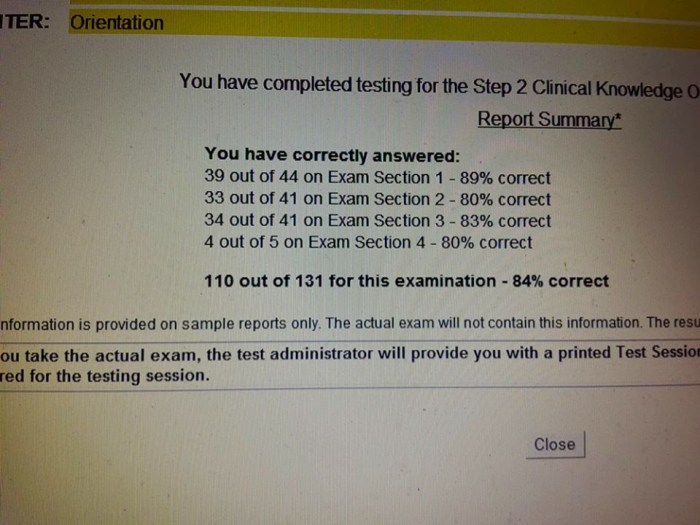
Effective time management is crucial for success on NBME 11. The exam consists of eight 60-minute blocks, each containing 40 questions. Allocating time wisely ensures you complete all sections and avoid rushing through questions.
Prioritize questions based on their difficulty. Start with questions you’re confident in, as they can boost your confidence and save time. Tackle more challenging questions later when you have a better understanding of the concepts being tested.
Pacing Yourself
Pace yourself throughout the exam. Avoid spending too much time on any one question. If you’re unsure about an answer, mark it for review and move on. You can return to it later if time permits.
Take short breaks between blocks to clear your mind and refocus. This helps prevent burnout and maintains your concentration.
Practice time management techniques during your preparation by taking timed practice exams under simulated exam conditions.
Scoring and Interpretation
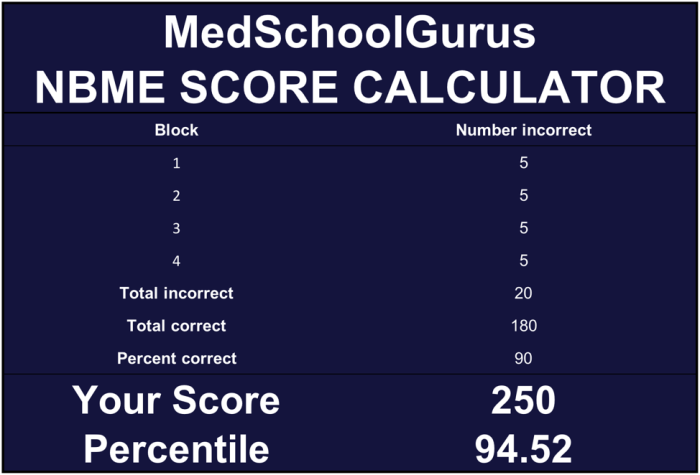
The NBME 11 utilizes a scoring system that assesses your performance on the exam. Understanding this system is crucial for interpreting your results and evaluating your progress.
Scaled Score
The NBME 11 uses a scaled score ranging from 1 to 300. This score is calculated based on the number of correct and incorrect answers, as well as the difficulty of the questions you encountered.
Your scaled score represents your overall performance on the exam and is not directly comparable to your raw score (the number of questions you answered correctly).
Percentile Rank
Along with your scaled score, you will also receive a percentile rank. This rank indicates the percentage of test-takers who scored lower than you on the exam.
A higher percentile rank signifies that you performed better than a greater proportion of test-takers. This can provide you with a sense of your relative standing among other candidates.
While preparing for NBME 11 Answers Step 2, you might need to brush up on your Excel skills. If you’re wondering how to sum values in Excel, check out this helpful guide: How To Sum In Excel . Once you’ve mastered the basics of Excel, you can return to NBME 11 Answers Step 2 with confidence.
Interpreting Your Score
Your NBME 11 score can provide valuable insights into your strengths and weaknesses. Here are some general guidelines for interpreting your results:
- Scaled Score above 240:This score is considered excellent and indicates a high level of medical knowledge and clinical reasoning skills.
- Scaled Score between 220 and 240:This score is considered good and suggests that you have a solid foundation in medical knowledge and clinical skills.
- Scaled Score below 220:This score indicates that you may need to strengthen your medical knowledge and/or clinical skills before taking the USMLE Step 2 CK.
It’s important to note that these guidelines are general and should not be taken as absolute. Your individual circumstances and goals may influence the interpretation of your score.
If you have any questions or concerns about your NBME 11 score, it’s advisable to consult with a trusted mentor or advisor for personalized guidance.
Test-Taking Tips
Navigating NBME 11 requires strategic test-taking skills. Employ general strategies and specific approaches for different question types to optimize your performance.
Before diving into specific question types, let’s explore some general tips that can enhance your overall test-taking experience:
- Time Management:NBME 11 is a timed exam, so effective time management is crucial. Allocate time wisely to each question, considering its complexity and length. Avoid spending too much time on any one question; if you get stuck, move on and come back to it later.
- Read Instructions Carefully:Each question type has specific instructions. Read them thoroughly to understand what is being asked before you start answering.
- Eliminate Incorrect Options:When possible, try to eliminate options that are clearly incorrect. This can narrow down your choices and increase your chances of selecting the correct answer.
- Guess Wisely:If you’re unsure about an answer, make an educated guess based on the information provided in the question or passage. Avoid random guessing as it can lower your overall score.
- Review Your Answers:If time permits, review your answers before submitting them. This can help you identify any errors or oversights.
Multiple Choice Questions
Multiple choice questions (MCQs) are the most common question type on NBME 11. Here are some specific tips for answering them effectively:
- Read the Stem Carefully:The stem presents the clinical scenario or question. Understand the context and key details before reading the options.
- Consider All Options:Don’t just jump to the first option that seems correct. Read and evaluate all options carefully, even if you think you know the answer.
- Identify s:Pay attention to s in the stem and options. These can help you narrow down the correct answer.
- Use the Process of Elimination:Eliminate options that are clearly incorrect or irrelevant to the question.
- Choose the Best Answer:Select the option that best answers the question or completes the statement.
Extended Matching Questions
Extended matching questions (EMQs) present a list of options and a series of statements or questions. Your task is to match each statement or question to the most appropriate option.
- Read the Instructions:EMQs often have specific instructions regarding how many options can be matched to each statement. Read these instructions carefully.
- Identify the Key Words:Focus on identifying s in both the statements and options. This will help you match them correctly.
- Use the Process of Elimination:As with MCQs, eliminate options that are clearly incorrect or irrelevant.
- Consider Multiple Matches:Some statements may have multiple correct matches. Read the instructions carefully to determine how many matches are allowed.
- Check Your Matches:Once you’ve made your matches, review them to ensure they make sense and are consistent with the information provided.
Case-Based Questions
Case-based questions (CBQs) present a clinical scenario and ask you to answer questions based on the information provided. Here are some tips for tackling CBQs:
- Read the Case Carefully:Pay close attention to the details of the case, including the patient’s history, physical examination findings, and laboratory results.
- Identify the Key Issue:Determine the main clinical issue or question being addressed in the case.
- Apply Your Knowledge:Use your medical knowledge to analyze the case and answer the questions. Consider differential diagnoses, appropriate investigations, and management options.
- Support Your Answers:Provide evidence from the case to support your answers. This demonstrates your understanding of the clinical scenario.
- Manage Your Time:CBQs can be time-consuming. Allocate your time wisely and focus on answering the most important questions.
Additional Resources: Nbme 11 Answers Step 2
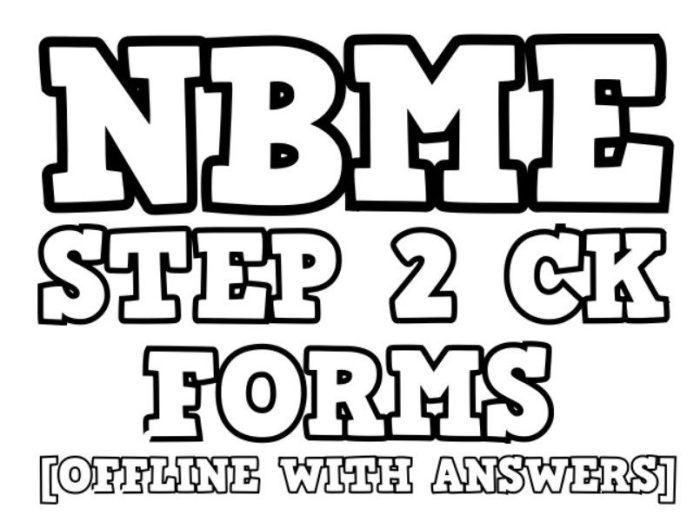
To further enhance your preparation and support your NBME 11 journey, consider utilizing the following resources:
For additional practice questions, study materials, and discussion forums, explore the following websites:
Online Resources
- USMLE-Rx: Offers comprehensive practice questions, study guides, and a question bank tailored to NBME 11.
- Kaplan Medical: Provides a variety of study materials, including live and on-demand courses, practice exams, and Qbanks.
- MedStudy: Offers a range of resources, such as video lectures, practice questions, and performance tracking tools.
- Reddit: Engage with a community of medical students and professionals on the r/Step2 subreddit for discussions, tips, and support.
Official Support Channels
If you encounter any technical difficulties or have questions about the exam, contact the official NBME support channels:
- NBME Contact Center: 1-800-648-6263
- NBME Email: [email protected]
Essential Questionnaire
What is the purpose of NBME 11 Step 2?
NBME 11 Step 2 assesses medical knowledge and clinical skills essential for practicing medicine independently.
How should I prepare for NBME 11 Step 2?
Use high-quality study materials, engage in active learning, and practice solving exam-like questions.
What is the passing score for NBME 11 Step 2?
The passing score varies depending on the specific medical specialty and jurisdiction.